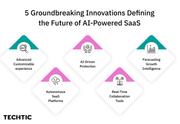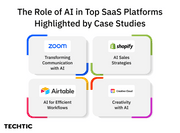AI-Driven SaaS Products: 2025 Trends and Innovations to Watch
Sector: AI + Data
Author: Nisarg Mehta
Date Published: 12/04/2024

Contents
- Why do SaaS Products Need AI Integration?
- 5 Innovations Shaping The Future of AI-Driven SaaS
- A Look at Challenges in AI-Driven SaaS Adoption
- How SaaS Can Prepare for an AI-Driven Future?
- How Top AI SaaS Platforms use Case Studies to Communicate with their Audience
- The Evolution of SaaS and the Role of Generative AI
- The Future Outlook: Where will AI-powered SaaS Take Us?
- Final Thought
Across the globe, 72% of organizations have now at least adopted AI in some way, clearly demonstrating its effects across the industry. And if you are a SaaS product owner – that is your sign to start implementing AI and take your platform to a new level.
Why is this important? In a nutshell, it’s about solving real-world problems – automating boring repetitive tasks, analyzing data in real time, and engaging every customer with highly personalized interactions.
In this blog, we will dig through the game-changing trends, top innovations, and real-life examples of how SaaS platforms are using AI to their advantage.
Why do SaaS Products Need AI Integration?
The fact is, traditional SaaS platforms often find themselves struggling with issues such as customer churn, inefficiencies, and being unable to deliver real-time insights without AI. The ultimate game changer is here: AI.
SaaS platforms are supercharged by AI which automates repetitive tasks and workflow, and improves decision-making through predictive analytics. Additionally, it increases productivity. It enables SaaS platforms to be smarter and offer more value to end users. In fact, more than 75% of enterprises are already employing multiple aspects of AI in their daily operations, and it’s become an essential part of business.
Take HubSpot, for example. They use AI-driven lead scoring and content optimization to help businesses better engage customers. And Slack uses AI to suggest workflows and make collaboration more efficient.
5 Innovations Shaping The Future of AI-Driven SaaS
AI is flipping the playbook of SaaS platforms on its head. Here’s a look at the innovations that are setting the stage for the future:

Hyper Personalized Experience
Visualize a SaaS platform that understands your users’ requirements before they know it. In turn, AI helps with hyper-personalization through real‐time analysis of user behavior and prediction of their next step. For instance, AI can be used by subscription management platforms to identify churn risks and to provide incentives to keep customers on board promptly.
Autonomous SaaS Platforms
Imagine if your SaaS product could automate itself. AI-powered autonomous platforms have a very low intervention from the human operator, from updates to automation of tasks. UiPath currently leads the charge here, with its Robotic Process Automation (RPA), which aims to enable businesses to automate workflows at scale.
AI-Powered Security
More sophisticated cyber threats require more sophisticated technology solutions and AI is at the disposal here. For example, CrowdStrike is a SaaS platform that uses AI to detect and neutralize threats in real time. It helps ensure that user data remains secure and users continue to give you their business.
Real-Time Collaboration Tools
AI and Remote work is the new normal. Apps like Miro use the power of AI to improve real-time collaborations with features like automated ideation and smart suggestions while brainstorming.
Growth Predictive Intelligence
AI isn’t just about reacting, it’s about forecasting. The use of AI by platforms like Tableau can predict user trends and business needs and allow SaaS companies always to be ahead with data-driven decisions.
A Look at Challenges in AI-Driven SaaS Adoption
While AI is the hero of the SaaS story, it has its own share of twists when it comes to integration. Here are the key challenges SaaS businesses face:
1. High Implementation Costs
AI integration isn’t cheap. Even for smaller SaaS companies, the costs from hiring experts to acquiring AI infrastructure can be too steep. Though it usually pays off, upfront costs can be very inhibiting.
2. Data Privacy and Compliance
The more great data you have, the more you take with it the great responsibility. SaaS platforms must conform to the likes of GDPR and CCPA. Mishandling of user data or not meeting compliance standards can cost heavy fines and misplacement of customer trust.
3. Lack of Knowledge and Expertise
There are vast capabilities available for AI, but not every SaaS team has the expertise to utilize all that potential. Thus, this gap leads to suboptimal implementation of AI or neglected opportunities to hit the potential that AI offers.
4. Competing Against AI: Small Businesses vs. AI Giants
For smaller SaaS companies pitted against giants such as Google Workspace, it can seem like a David vs Goliath contest. Smaller players are hard-pressed to catch up to the cutting-edge AI features being deployed by larger platforms.
How SaaS Can Prepare for an AI-Driven Future?
As AI is transforming the SaaS landscape, awareness alone is not enough to stay ahead here. Here’s how SaaS owners can gear up for an AI-powered future:
1. Start Small, Think Big
Don’t attempt to overhaul your platform in one go. Use cases that will deliver quick ROI, like customer support automation, and predictive analytics, are good places to start integrating AI. For instance, a basic AI chatbot could massively reduce workload and create higher response times.
2. Go with Scalable Infrastructure
The more you are on your platform, the greater AI’s potential. Build out with scalable infrastructure that can hold you as you scale your AI out. The AI-as-a-Service (AIaaS) market is expected to grow to $72.22 billion by 2029, which really simplifies the partnership process by partnering with AI providers such as Google Cloud AI or OpenAI.
3. Train Your Team
The success (or failure) of your AI integration will be based on your team’s expertise. Teaching them the skills to work with AI tools and analyze AI-driven insights, as well as adaptation to changing AI tools. When you have a well-trained team, AI can really go to its fullest potential.
4. Build Modular Platforms
Flexibility is made possible by modularity. Designing your SaaS product as a modular platform allows integration of the AI features without really disrupting the whole system. Also by this approach, it is easier to change and adapt to future advancements in AI.
5. Stay Informed
Currently, AI is evolving quickly, and maintaining awareness is no longer negotiable. Keep your platform future-ready by exploring new AI tools regularly, monitoring competitor’s strategies, and attending industry events.
How Top AI SaaS Platforms use Case Studies to Communicate with their Audience
Let’s take a closer look at SaaS platforms that have embraced AI and are reaping the rewards:

Zoom: AI for Seamless Communication
Remote communication is getting smoother with the help of AI as Zoom integrates it. The noise suppression features are powered by AI and the real-time transcription makes the meetings better and more accessible. Zoom’s AI tools ensure you sound professional no matter if you’re in a noisy café or multitasking on a call.
Shopify: AI for Smarter Sales
AI powers personalized shopping experiences and sales on Shopify. Shopify offers AI tools that can predict anything from product recommendations to predictive sales forecasting, enabling its customers (the sellers) to make data-driven decisions that increase revenue and customer satisfaction.
Airtable: AI for Workflow Management
Airtable is spreadsheets with AI muscle. Airtable’s offering of predictive workflows and intelligent suggestions enable project management with its teams to be more efficient and productive.
Adobe Creative Cloud: AI for Creativity
The AI at the core of Adobe Creative Cloud is changing the game for content creators. Automatic image cropping, content-aware fill, and smart tagging for media libraries are all powered by it. Adobe’s AI tools help you work more quickly and to reach more people with your creativity.
The Evolution of SaaS and the Role of Generative AI
The SaaS world is experiencing a revolution with generative AI which brings new capabilities for creativity, efficiency, and user engagement. Here’s how it’s shaping the future:
Content Creation Made Easy
The content creation woes of businesses are being solved by generative AI tools. Notion AI is a platform that helps users brainstorm ideas, draft documents and organize thoughts easily. These tools are a boon for productivity no matter whether you’re churning out marketing copy or summing up a report.
Coding Assistance
Generative AI tools like GitHub Copilot offer developers suggestions for code snippets, automate routine coding tasks, and even find code errors. This accelerates development and does so more accurately.
Enhanced User Collaboration
Although Generative AI is known for its automation, that’s not all there is to it. AI brainstorming tools powered by AI can help you create new ideas and concepts making your team collaboration sessions productive. Imagine a saas platform that works as a creative partner — suggesting in real time.
Future Potential
Generative AI possibilities in SaaS are endless. AI also is poised to become a core feature in SaaS platforms; AI will help them to create hyper-personal experiences for their customers and automate complex workflows. Those who take it early will be different, better, and ahead.
The Future Outlook: Where will AI-powered SaaS Take Us?
The Relationship of the Future of SaaS and the Future of AI – it’s Undeniable. Here’s what SaaS owners can expect—and prepare for—in the coming years:
Autonomous SaaS Platforms
Platforms that need the bare minimum of human interventions will run on AI. What if you had SaaS solutions that could autonomously update, tackle workflows, and deliver predictive insights without the user having to lift a finger? This isn’t a dream, it’s just the evolution of the situation.
Core Feature: Generative AI
The move from ‘nice-to-have’ to ‘must-have’ will be catalyzed by generative AI. SaaS platforms will use it to generate tailored content automate communication, or even co-develop features with human teams. But you can think of it as having a brilliant, tireless assistant baked into your software.
Personalization at Scale, But More Meaningful
It will go further than just recommendations. By leveraging AI, we can personalize entire user journeys, from onboarding to advanced utilization, to provide the user with a different and captivating experience each time. Those SaaS platforms that get it right will develop stronger customer loyalty.
Non-Negotiable – Data-Driven Decision Making
SaaS businesses will back every critical decision with AI-powered analytics. Tools such as Tableau will keep getting better and better to perform faster and more accurate forecasting and planning.
Early Adoption is the Competitive Edge
Today, the SaaS companies that integrate AI will lead, tomorrow. Paying attention to AI trends, scaling quickly, and a bet on training will provide a very significant advantage to forward-thinking businesses.
Final Thought
The message is clear: Not only is AI reshaping SaaS, but it’s fast becoming the backbone of its future. Adapting early and utilizing AI to its fullest will help some businesses survive this very innovative time.
If you’re exploring AI integration possibilities into your SaaS product, you must contact AI consultants at Techtic. Our AI consultancy service aims to identify the best possible AI use case for your SaaS product and help you devise an implementation roadmap. Get started today!



